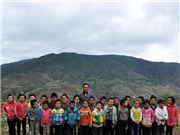

STUNG TRENG, Cambodia, April 1 -- Spanning the Mekong River in far northeastern Cambodia, the newly-built 1.73-km Mekong bridge, along with a 143-km road, have raised hope for better living conditions of residents in this far northeastern region.
The bridge and road, linked Stung Treng province's rural parts and its provincial town, are crucial for enabling more travel and trade, and this infrastructure also connects the province to Vietnam and Laos' borders, as well as its neighboring Preah Vihear province.
Local residents say the bridge, dubbed the Cambodia-China Friendship Stung Treng Bridge, will greatly contribute to improving people's living conditions.
"The bridge will save us a lot of money," an agricultural product broker, Phai Sopheap, 47, who buys farm produce from rural areas to sell at markets in the town, told Xinhua on Tuesday, recalling that prior to the bridge, she spent about 300 U.S. dollars per month for ferry crossings.
"With the bridge, it is easy to travel to and fro, and we can travel any time we want," she said.
Sopheap said in the past, it was very difficult to travel at night because both ferries and boats did not offer their services, or charged high fares for any urgent crossings.
Don Bora, 21, a farmer in the province's Thala Barivat district, said the bridge and road have also saved him both money and time.
"Prior to the bridge, a person, along with a motorcycle, needed to spend 10,000 riels (2.5 U.S. dollars) for crossing the river per time by boat, or 5,000 riels (1.25 U.S. dollars) by ferry," he said, adding that it was about 20 km from his home to the town.
"Usually, I go to town about seven or eight times per month to buy goods or materials for farming," he said. "Previously, it took me three or four hours to travel between my home and the town, due to poor roads and time spent waiting for boat or ferry, but now, it takes me only 30 minutes to travel by motorcycle," he said.
Bora said with the bridge, rural people getting seriously ill at night will be able to be sent to hospitals in the town on time, instead of waiting until the next morning.
"I would like to express my sincere gratitude to the Chinese government for constructing this bridge for Cambodia, we can now travel much easier," he said.
According to Cambodian Transport Minister Tram Iv Tak, the bridge and road were constructed in three years by the Shanghai Construction (Group) Company, under a concessional loan of 116 million U.S. dollars, which was financed by the Chinese government.
"This project will improve living conditions of Cambodian people, especially ethnic minority groups," he said at the inauguration ceremony on Wednesday. "About 90 percent of the people living along the road are ethnic minority groups who earn their living by collecting sub-forest products and farming."
Chinese Ambassador to Cambodia Bu Jianguo is confident that the bridge and road will definitely contribute to enhancing living conditions of the people in the far northeast area.
"The bridge and road will make travel easier and people living on both sides of the Mekong River can easily go to and fro," she said.
She added that China sees transport infrastructure development as a top priority for Cambodia in economic development and poverty reduction.
"The achievement clearly shows a close and fruitful cooperation between China and Cambodia," she added.
Cambodian Prime Minister Hun Sen said transport infrastructure is very important for Cambodia, and China has provided Cambodia with a lot of new bridges and roads.
"The bridge and road we inaugurate today will provide enormous benefits to Cambodian people, especially for residents living on both sides of the Mekong River," he said.
"Through Ambassador Bu Jianguo, I'd like to express my heartfelt gratitude to the government of China and its people for providing both grants and loans to Cambodia for economic development and poverty reduction," he said.
 |
Day|Week

 Tsinghua junior makes over 10,000 yuan a day by selling alumnae's used quilts
Tsinghua junior makes over 10,000 yuan a day by selling alumnae's used quilts Graduation photos of students from Zhongnan University
Graduation photos of students from Zhongnan University A school with only one teacher in deep mountains
A school with only one teacher in deep mountains Glimpse of cultural heritage "Xilankapu"
Glimpse of cultural heritage "Xilankapu" Homemade cured hams in SW China
Homemade cured hams in SW China Breathtaking buildings of W. Sichuan Plateau
Breathtaking buildings of W. Sichuan Plateau Graduation photos of "legal beauties"
Graduation photos of "legal beauties" Top 10 most expensive restaurants in Beijing in 2015
Top 10 most expensive restaurants in Beijing in 2015